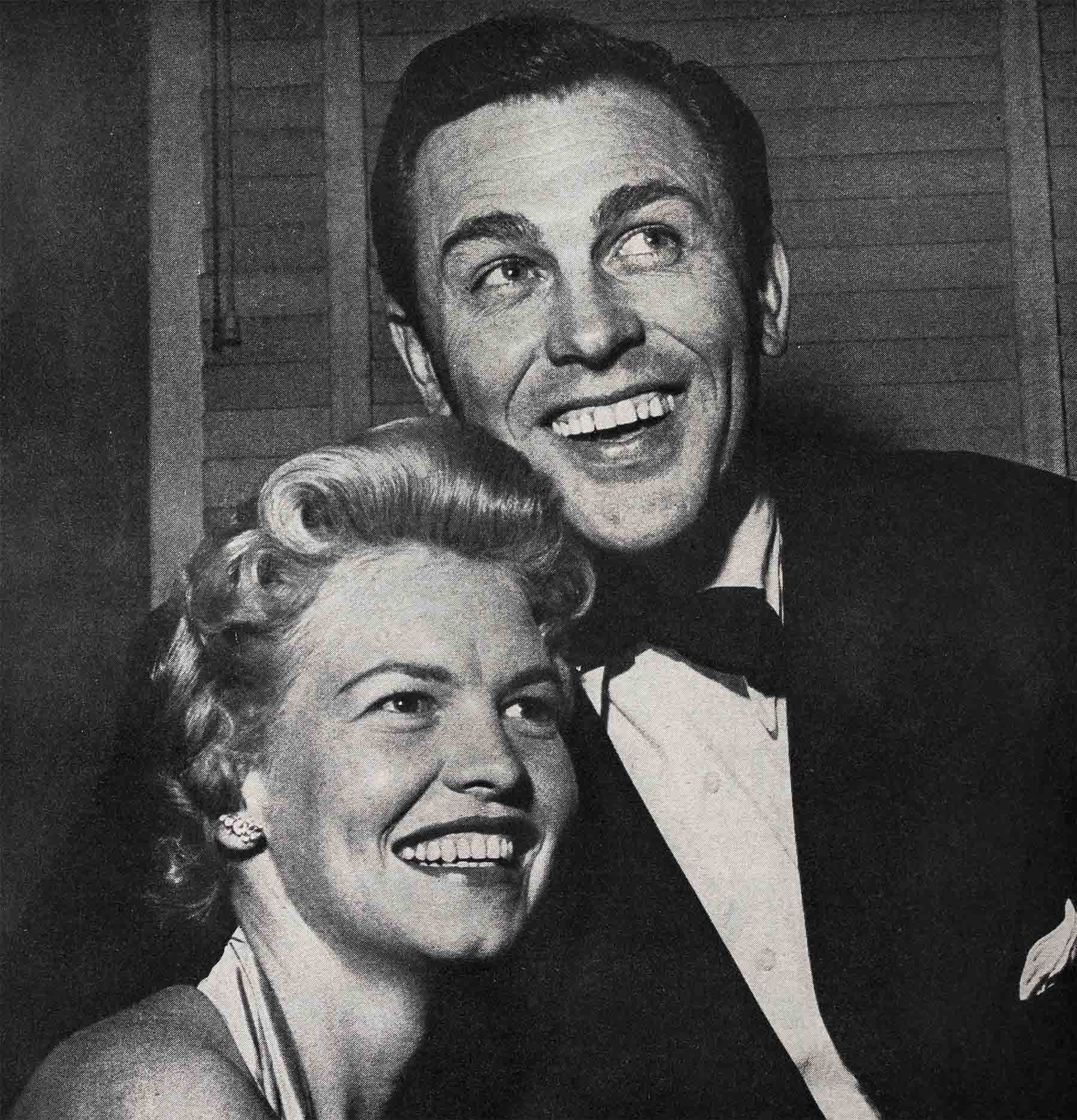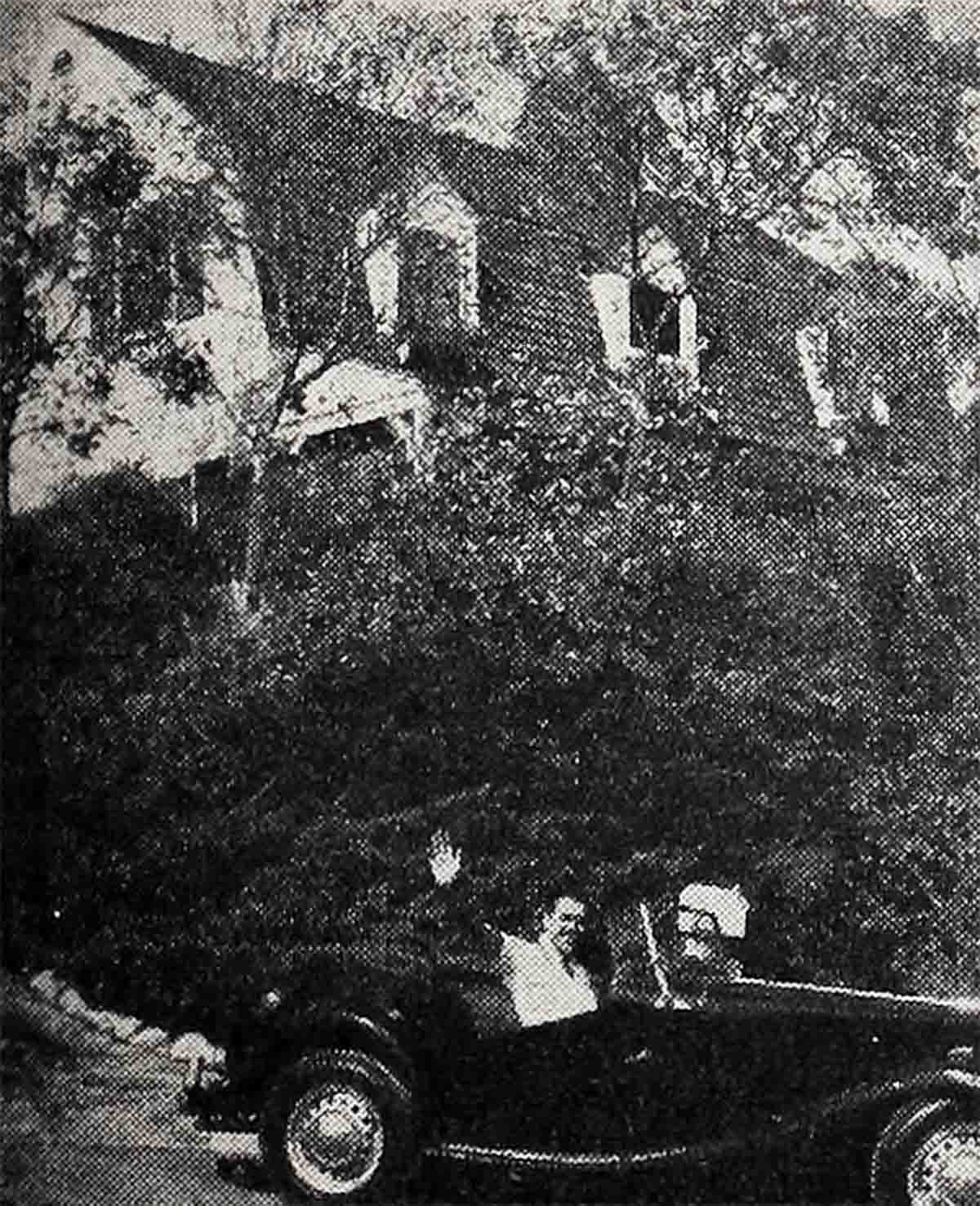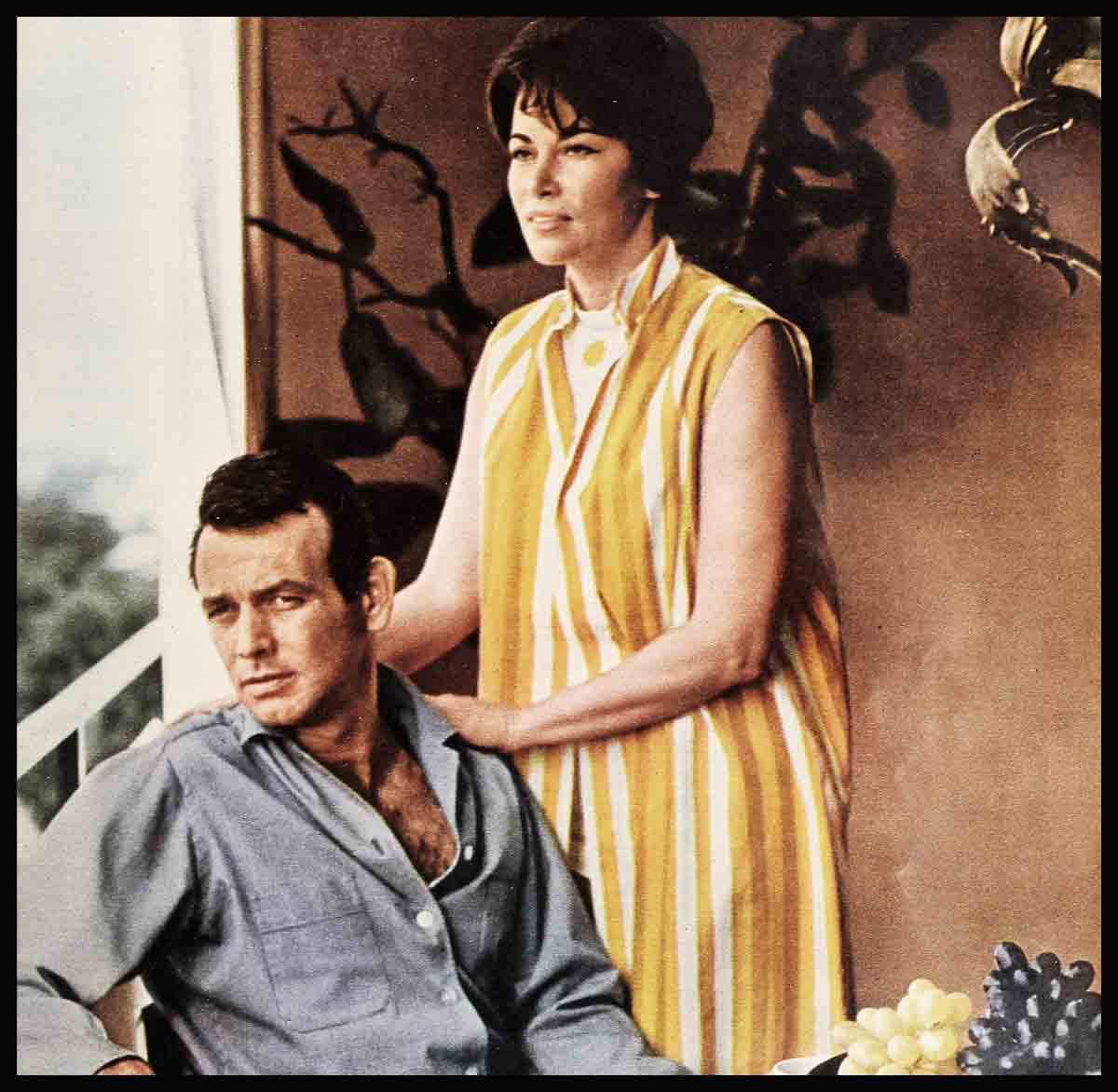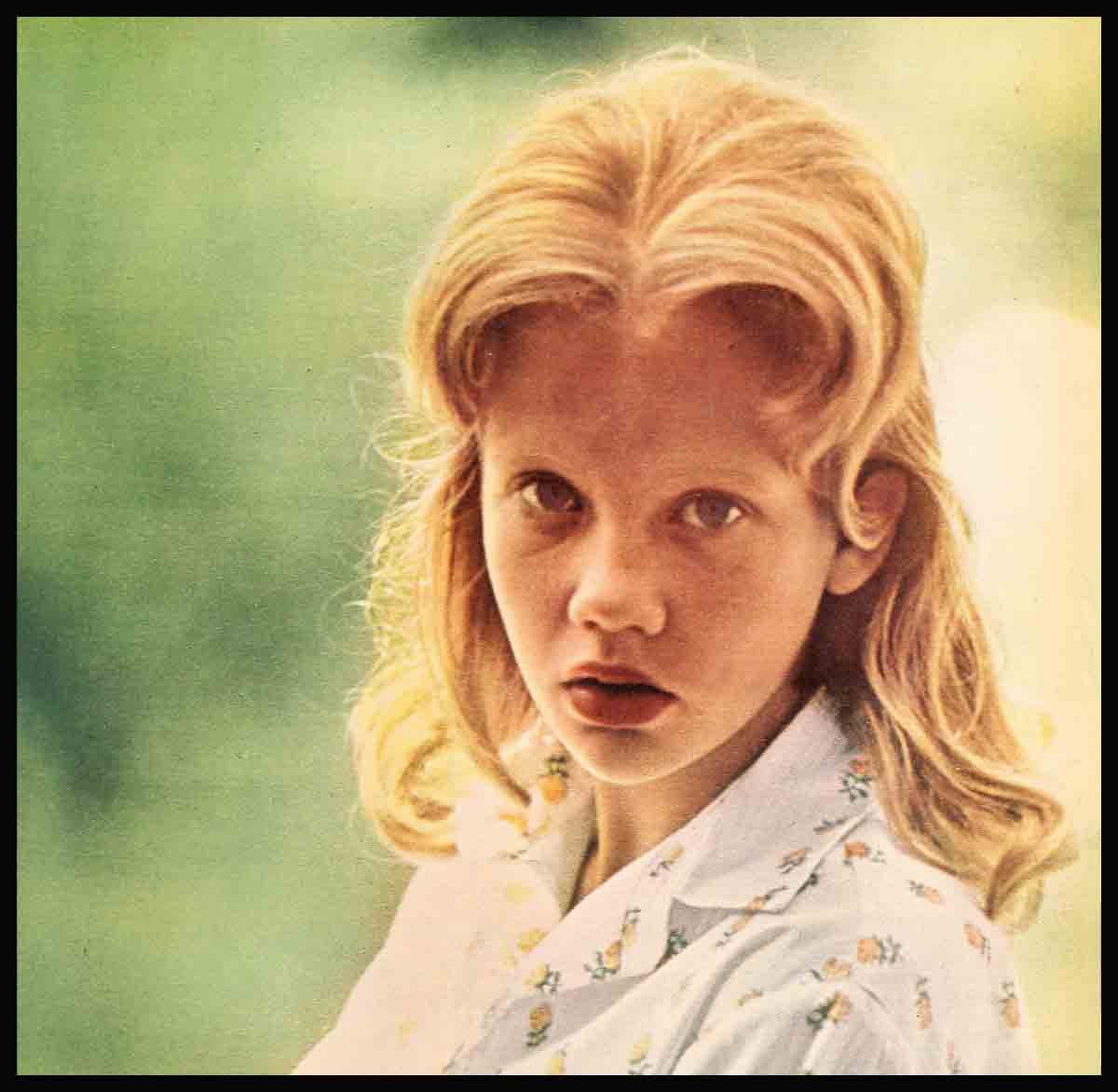Howard Keel’s Kingdom
It late afternoon and the man behind the wheel of the red sportscar is tired from a long day in front of blinding hot lights and the exacting demands of the cameras. But the car handles easily as he swings it through the comfortable neighborhood of redwood fences, green terraces, and stately eucalyptus trees. A neighborhood warmed by the last coral rays of the setting sun and cooled by the fresh ocean breeze, echoing with the happy shouts of chubby pig-tailed girls and freckled boys whistling and running and laughing. A family neighborhood.
As he swings the red car up the steep driveway toward the delightful two-story Connecticut farmhouse, his eyes light up with a glow of anticipation and pleasure that illuminates his whole face. Howard Keel has come home.

At the other end of the driveway is the reason for his anticipation—his wife kneeling with her arms around their two daughters—a welcoming household of women who smile up at him and can hardly wait until he gets out of the car before they leap all over him with laughter and kisses.
This to Howard Keel is the beginning and the end of a perfect day, a day during which he has been a perfectionist at the studio and satisfied himself that he has done the best job that he could possibly do. Now he is home again, hungry and a little tired but happy and relaxed, confident that in his life hard work is rewarded by love and affection. His pretty blond, brown-eyed wife, Helen, junior misses Kaiya and Kristine, and their good-natured helper, Bessie, all radiate the love and affection that can come only from serene happiness.
Despite his own insistence that when he’s working he tends to be tense and preoccupied, everything about his home reflects harmony. Living is easy, and obviously this harmony is meant to last. The house is furnished in a mellow mood—with the richness of mellowed alderwood in king-sized and demi-sized furniture designed by Howard.
It’s then made up especially for the Keels by a cabinet maker in Culver City. The gleam of silver, lovingly polished. The deep comfortable floral-patterned chairs and ottomans. The favorite chairs pulled close like the Four Bears to the den’s brick fireplace. A small red chair close to an over-sized brown one. A well-scribbled child’s blackboard.
Howard is admittedly a sentimental man. He treasures old things—a worn leather chair. Personal things—a tile table telling the story of his life which was painted for him by one of his closest friends, Louis Calhern. Milestone markers—a scroll signed by the stars and crew of “Annie, Get Your Gun,” his first M-G-M picture. Family souvenirs—an oil painting of a golden-haired child in a blue dress, Kaiya, as painted by her dad.
Like parts in a jigsaw puzzle that’s been assembled, everything fits together so perfectly it’s impossible to imagine things any other way.
And to Howard Keel, there could be no other way that would be right. This is a goal toward which he has been working his entire life. Not just his adult life. This is what he has wanted from his earliest recollections, when he was a boy in the grim coal-mining town of Gillespie, Illinois, and yearning to be like other kids. What made him different was poverty. Howard knew poverty well, real poverty, and he knew shame.
To a sensitive boy—too thin, too shabbily dressed, too rebellious—there was an unforgettable anguish in the early death of his father, a death brought on by the man’s despair. And there was heartbreak in the heroic battle his mother waged—running a paper-hanging business, taking in washing and ironing—to keep her two sons clad and fed.

Howard, born Harry, Keel, has come a long way since then. He has hewed out a career that has won him wealth and fame. This success has meant even more to Howard, perhaps, than it would to most people. It has given him an opportunity to provide his children with the things he has missed.
Not so much the financial things—although certainly these are important—as the emotional things, the security and the warmth that comes from a family in which there is time for love and affection—and an understanding of its necessity.
When Howard Keel first came to Holly- wood, he made a set of solemn vows: No matter what the glittertown did to others, he was determined to have a real marriage and a normal home, a home complete in itself, a happy home. Above all, he was not going to allow his career and its obligations to turn the lives of his children topsy-turvy with publicity and an exaggerated sense of their own importance. They were to be treated as if their father were a plumber or a lawyer or a streetcar conductor.
He lives in constant fear of their being spotlighted and singled out and cheated of their carefree years, much the same—although for exactly the opposite reason—as he was spotlighted and singled out and cheated of his own childhood years that should have been carefree and happy.
“We live in a family neighborhood where there are a lot of normal little kids,” Howard says, “kids who are all growing up with every chance for the future—the chance to live their own lives. I want my kids to have that same chance.
“I don’t want them to feel any different from the other neighborhood children, to feel they’re on exhibition and apart. When their playmates come to our house, I don’t want those kids to feel they’re coming to a circus grandstand. That might be fun for a short time, but not for long. I’ve seen it happen with other families. After a while, everyone gets sick of the circus, even the kids, and the only friends they could have would be other children in the same predicament.”
Howard Keel’s is a tough iron mind and an iron will. A will as iron as his heart is warm. His convictions are as deep down as his basso voice. And on this subject—until somebody can show him sufficient reason to change—he’s as unshakeable as the Canadian Mountie he plays in M-G-M’s “Rose Marie.” But his is not temperamental star-stand. He’s always felt this way, and he voiced it long before he became a star. When he first signed with M-G-M, he wanted one thing clear. He would keep his home life separate from his career. “If I can’t—I won’t be in motion pictures,” he said then. “I’ll go back to musical comedy.” Success has only strengthened this resolve.
It’s characteristic of Howard Keel that he is a perfectionist about his work. The part of the romantic roué who knocked Kathryn Grayson around and spanked her in violent 3-D in “Kiss Me Kate” was by far the best part he’s had.
But what isn’t generally known is that “Kiss Me Kate” was also the biggest challenge Howard Keel has faced in pictures to date. Only two people in the whole studio thought he could do it, since he had never done any Shakespeare, and even in modern dress Shakespeare is still Shakespeare and a challenge to the greatest actors. He made two tests, the first of which was so terrible that for weeks he buried himself studying with Lillian Burns, the studio dramatic coach. The next test was good enough to get him the part.
Whatever the challenge, the dimension or the scope, one thing is sure—his career couldn’t be going any better than it is today.
Howard was still dubbing “Rose Marie,” his seventh picture in a year, when “Seven Brides for Seven Brothers,” co-starring Jane Powell, started production. Far from complaining, Howard leaped at the opportunity to keep working steadily. Where another man might have complained that he’d only had three days off in a year and a half, Howard just grinned and made like Leo the Lion. His life is built upon hard work at a trade he finds satisfying, followed by love and relaxation at a home he likes to feel is his castle, and one without the other would make that life incomplete.
Howard’s a handy man to have around the house. He’s the official carver for their crowd and thinks nothing of it when a harried dinner-hostess calls anxiously, “Harry, would you mind coming over a little early tonight?” But try to put a hoe or rake in his hand—and nothing happens. He hates mowing lawns and working the yard, he admits, so he doesn’t do it. That is one of the reasons he works so hard at the studio. It gives him a freedom that otherwise he could never be able to enjoy.
On the other hand, give him a wrench and he’s good for a solid Sunday afternoon working on his car, which seems to relax him as much as a Turkish bath.
One Sunday afternoon recently, Howard was dressed in overalls and tinkering when a group of little girls wandered up the drive. They were carrying autograph books and one of them had a wilted bouquet of flowers.
“Does Howard Keel live here?” asked the girl with the bouquet.
Howard grinned and said, “Yes, he does.”
The girls waited expectantly for the grease-streaked man to call the movie star to the door. And they looked startled when he added, “What do you want, kids?” and started signing their books, feeling a bit like a small boy after his prank.
One of the few things that plague Howard Keel’s life is that he can’t spend enough time with Helen, his wife. She is a very womanly person, once a dancer in the ballet of “Oklahoma.” Sweet, warm, wholesome, with a very good head on her shoulders. And he’s concerned—probably more even than he shows—because his busy picture schedule means that vacation trips, social evenings and the like must be continually postponed. This doesn’t bother Howard as much as he thinks it cheats Helen. But soon he hopes to be able to do something about it.
In the meantime, Howard Keel is one of the happiest men in Hollywood. He has worked incredibly hard to build a life that is as perfect as any life can be, and he’s willing to work just as hard to keep it that way, gradually erasing as completely as possible the fears that still haunt him from his childhood, and seeing to it that his children’s lives are rich in all the real and solid gifts of normalcy.
THE END
It is a quote. PHOTOPLAY MAGAZINE AUGUST 1954





No Comments